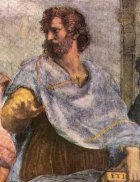
Worksheets and No Prep Teaching Resources
Reading Comprehension Worksheets
Ancient Greece

Ancient Greece
 Worksheets and No Prep Teaching Resources Reading Comprehension Worksheets Ancient Greece |
 Ancient Greece |
| edHelper's suggested reading level: | grades 6 to 8 | |
| Flesch-Kincaid grade level: | 7 |
|
Aristotle
By Vickie Chao |

|
 1 Back in the old days, there were three wise men in ancient Greece. These three wise men were from three different generations. Socrates was the oldest of the trio. He passed his knowledge to his student, Plato, who then passed it on to Aristotle. Socrates, Plato, and Aristotle were all great philosophers. Together, their schools of thought have since become the foundation of Western philosophy.
1 Back in the old days, there were three wise men in ancient Greece. These three wise men were from three different generations. Socrates was the oldest of the trio. He passed his knowledge to his student, Plato, who then passed it on to Aristotle. Socrates, Plato, and Aristotle were all great philosophers. Together, their schools of thought have since become the foundation of Western philosophy. |
Create Weekly Reading Books
Prepare for an entire week at once! |
| Leave your feedback on Aristotle (use this link if you found an error in the story) |
 |
Ancient Greece
|
 |
Social Studies
|